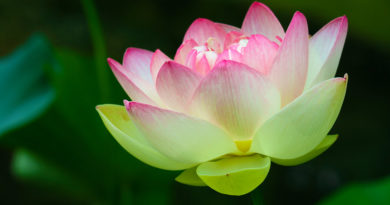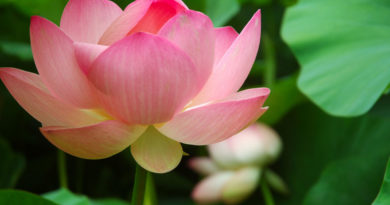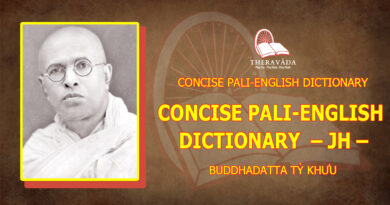DHAMMA PADETHA – 17. EATING THE RIGHT WAY BRINGS MERIT
DHAMMA PADETHA – EATING THE RIGHT WAY BRINGS MERIT
Wise people who respect dhamma, wish to eliminate demerits and gain merit as much as possible. In every respect they wish to gain merit even while eating.
Out of the three requirements, food, clothing and shelter, food is the most important because it is a daily necessity. While eating if we do not have proper reasoning we become attached to the good food, which is lobha. When the food is not good we are disappointed, which is dosa. Depending on the food we eat every day we are as though increasing lobha, dosa, demerits. That is why those who respect dhamma and wishing to gain merit must eat in such a way so as to gain merits.
There are three kinds of eating to gain merits
(1) Eating with sila
(2) Eating with samatha
(3) Eating with vipassana
(1) Eating with sila is as follows:
We must reflect that we do not eat for amusement like children, neither do we eat to beautify ourselves, nor do we eat to have strength and pride. We eat so as to have sound health to be able to work for the sasana, to work for the benefit of ourselves and others, to practise noble dhamma. Thus, eating with wisdom is known as eating with sila.
Motto: To enable us to practise dhamma,
eating with wisdom is eating with sila.
(2) Eating with samatha is as follows:
While eating the food, we try to extend our metta towards those who prepared and cooked the food, towards our parents and teachers who were our benefactors; toward those who have come to donate the food. Beginning from these people may all creatures from the ten directions be healthy and happy. This kind of eating is eating while gaining samatha merit.
Motto: Extending metta while eating is eating with samatha.
(3) Eating with vipassana is as follows:
Beginning from seeing the food, noting every action while eating.
When we see the food we note ‘seeing, seeing’ just as we see it. When we put out our hand to the meal table we note ‘reaching, reaching;’ when we touch the food we note, ‘touching, touching’. When we prepare food for a mouthful, we note ‘preparing, preparing.’ When we take the food ‘taking, taking’. When we lower our heads ‘lowering lowering’; when we put the food into our mouths ‘putting, putting’; when we put our head up ‘putting our head up’; when chewing the food ‘chewing, chewing’; when we know the taste ‘knowing, knowing‘; when we swallow, ‘swallowing, swallowing.’ Thus if we note every action while eating it is eating with vipassana. We attain vipassana merit.
Motto: Noting the actions while eating is eating with vipassana.
Eating with vipassana, at the beginning we tend to forget many actions. But later when we get into the habit of noting we could note every action. At the beginning of noting we should keep any obvious action as the main object, reaching for the meal table or lowering your head or chewing as the main object. If you can note one thing, later you will be able to note everything.
While noting and as your concentration develops to a certain extent, you will realize that the action of the physical body is separate and the noting mind is separate. Later when samadhi deepens step by step you will discover that the desire to eat and the action of eating disappears or passes away step by step and you are gaining vipassana merit while eating. Those whose paramis are mature have attained noble insight.
Long ago the teacher (upajjhaya) Mahasangharakkhita, the uncle Sayadaw, and Sangharakkhita, the nephew samanera, were residing together at the same monastery. At eight-thirty, or nine o’clock in the morning the samanera went round the houses for alms-food. When he came back to the monastery at about ten thirty or eleven o’clock he ate the food. While eating it the Sayadaw came and admonished, by saying, “Samanera, do not burn your tongue with hot rice and curry” although the monk knew that the alms-food which has been collected from houses has become entirely cold at ten thirty, eleven o’clock, and yet he admonished that the samanera must not burn his tongue with hot rice and curry. Sayadaw does not mean the actual rice and curry, he meant to say do not burn the tongue with lobha, dosa hot food. Thus the samanera was mindful of his actions while eating.
When you eat good food and are not mindful you become attached to the food which is lobha (rasatanha). When you eat inferior food, you are displeased and have dosa. Thus lobha, dosa hot food burn your tongue. So as not to burn, the young samanera ate with mindfulness. While eating with mindfulness, he became an arahant.
Motto: While eating with vipassana, became an arahant.









